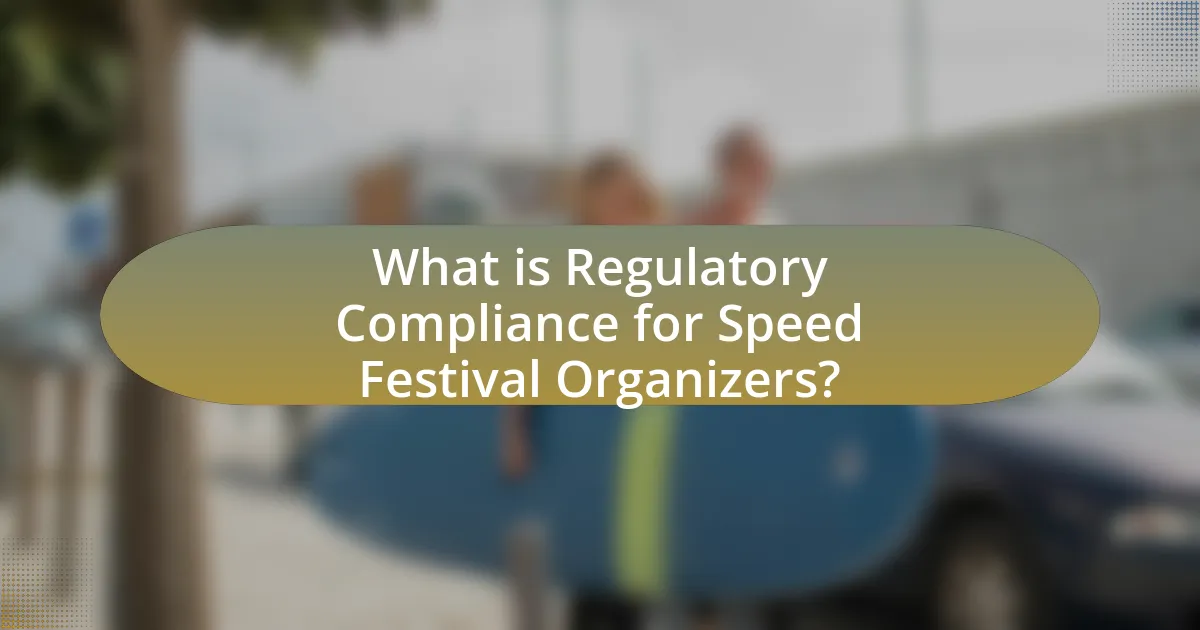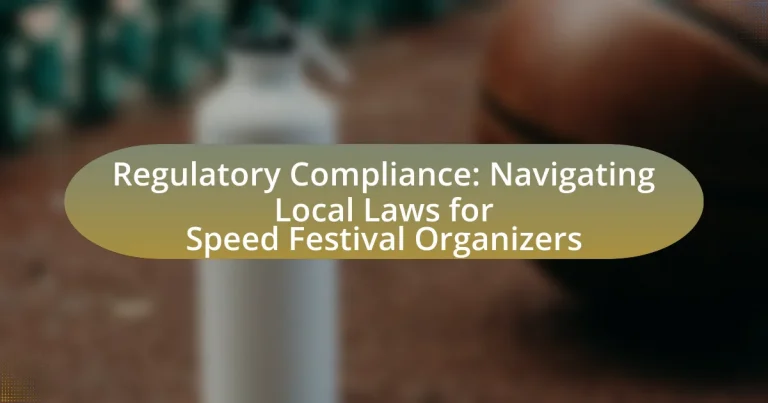Regulatory compliance for speed festival organizers involves adhering to local, state, and federal laws that govern the planning and execution of speed-related events. Key components include obtaining necessary permits, ensuring safety standards, and complying with environmental regulations. The article outlines the importance of compliance in safeguarding participants and spectators, the risks associated with non-compliance, and best practices for navigating local laws. It also discusses the challenges organizers face, such as understanding complex regulations and maintaining communication with local authorities, while providing strategies for effective compliance management.

What is Regulatory Compliance for Speed Festival Organizers?
Regulatory compliance for speed festival organizers refers to the adherence to local, state, and federal laws and regulations governing the planning and execution of speed-related events. This includes obtaining necessary permits, ensuring safety standards are met, and complying with environmental regulations. For instance, organizers must often secure permits from local authorities, which may involve demonstrating compliance with noise ordinances and traffic management plans. Additionally, safety regulations may require the implementation of measures to protect participants and spectators, such as medical support and crowd control protocols. Failure to comply with these regulations can result in fines, event cancellations, or legal liabilities.
Why is Regulatory Compliance important for Speed Festivals?
Regulatory compliance is crucial for speed festivals because it ensures the safety of participants and spectators while adhering to local laws. Compliance with regulations, such as those related to vehicle safety, crowd control, and environmental impact, minimizes the risk of accidents and legal liabilities. For instance, failure to comply with safety standards can lead to severe injuries or fatalities, as evidenced by incidents in motorsport events where non-compliance resulted in tragic outcomes. Additionally, adhering to local laws helps organizers avoid fines and sanctions, thereby maintaining the festival’s reputation and financial viability.
What are the potential risks of non-compliance?
The potential risks of non-compliance include legal penalties, financial losses, and reputational damage. Legal penalties can manifest as fines or sanctions imposed by regulatory authorities, which can vary significantly based on the severity of the violation. Financial losses may arise from operational disruptions, increased insurance costs, or the need for corrective actions. Reputational damage can lead to a loss of trust among stakeholders, including participants, sponsors, and the community, ultimately affecting future events. For instance, a study by the Compliance, Governance and Oversight Council found that organizations facing compliance issues experienced an average revenue decline of 20% due to reputational harm.
How can compliance enhance the festival’s reputation?
Compliance can enhance a festival’s reputation by demonstrating a commitment to safety, legality, and community standards. When festival organizers adhere to local laws and regulations, they reduce the risk of legal issues, which can lead to negative publicity and damage to the festival’s image. For instance, compliance with health and safety regulations ensures that attendees feel secure, fostering positive experiences that encourage word-of-mouth promotion. Additionally, festivals that prioritize environmental regulations can attract eco-conscious attendees, further enhancing their reputation. Studies show that events perceived as responsible and compliant can see increased attendance and sponsorship opportunities, as stakeholders prefer to associate with reputable organizations.
What are the key components of Regulatory Compliance?
The key components of Regulatory Compliance include understanding applicable laws, implementing policies and procedures, conducting training, monitoring compliance, and ensuring reporting and documentation. Understanding applicable laws involves identifying local, state, and federal regulations relevant to specific activities, such as organizing speed festivals. Implementing policies and procedures ensures that organizations have clear guidelines to follow, which helps mitigate risks associated with non-compliance. Conducting training equips staff with the knowledge necessary to adhere to these regulations. Monitoring compliance involves regular audits and assessments to ensure ongoing adherence to laws and internal policies. Finally, ensuring proper reporting and documentation is crucial for demonstrating compliance and addressing any potential legal issues.
What types of local laws must organizers be aware of?
Organizers must be aware of zoning laws, noise ordinances, health and safety regulations, and permits required for events. Zoning laws dictate where events can be held, while noise ordinances regulate sound levels to minimize disturbances. Health and safety regulations ensure the well-being of attendees, including crowd control measures and emergency protocols. Additionally, specific permits, such as those for food vendors or alcohol sales, are often required to comply with local regulations. These laws are crucial for ensuring that events are conducted legally and safely, thereby avoiding potential fines or legal issues.
How do safety regulations impact festival planning?
Safety regulations significantly impact festival planning by dictating the necessary measures to ensure the health and safety of attendees. These regulations require organizers to implement specific protocols, such as crowd control, emergency response plans, and structural safety assessments for stages and installations. For instance, the National Fire Protection Association mandates that festivals adhere to fire safety codes, which can influence the layout and design of the event. Compliance with these regulations not only helps prevent accidents but also mitigates legal liabilities, as failure to adhere can result in fines or event cancellations. Thus, safety regulations are integral to the logistical and operational aspects of festival planning, shaping decisions from venue selection to staffing requirements.
What are the common challenges in achieving Regulatory Compliance?
Common challenges in achieving regulatory compliance include understanding complex regulations, maintaining up-to-date knowledge of legal requirements, and managing resource constraints. Speed festival organizers often face difficulties in interpreting local laws, which can vary significantly by jurisdiction, leading to potential non-compliance. Additionally, the dynamic nature of regulations requires continuous monitoring and adaptation, which can strain limited resources, both financial and human. According to a survey by the Compliance Institute, 60% of organizations reported that keeping up with regulatory changes is their biggest compliance challenge.
What obstacles do organizers face when navigating local laws?
Organizers face several obstacles when navigating local laws, including complex regulatory frameworks, varying permit requirements, and inconsistent enforcement practices. The complexity arises from the need to understand multiple layers of regulations, such as zoning laws, safety codes, and environmental regulations, which can differ significantly from one jurisdiction to another. For instance, a study by the National Association of Counties highlights that 70% of local governments have unique permitting processes, complicating event planning. Additionally, organizers often encounter challenges in securing necessary permits due to lengthy approval timelines and bureaucratic red tape, which can delay event preparations. Inconsistent enforcement practices can further complicate compliance, as different local authorities may interpret and apply laws differently, leading to potential legal disputes or fines.
How can organizers overcome these challenges?
Organizers can overcome regulatory compliance challenges by conducting thorough research on local laws and regulations relevant to speed festivals. This involves consulting legal experts and local authorities to ensure all permits and licenses are obtained prior to the event. For instance, a study by the International Association of Event Hosts highlights that 75% of successful event organizers prioritize legal compliance by engaging with local government early in the planning process. Additionally, implementing a compliance checklist can help organizers systematically address all regulatory requirements, reducing the risk of last-minute issues.

How do Local Laws Affect Speed Festival Planning?
Local laws significantly influence speed festival planning by dictating the legal framework within which organizers must operate. These laws encompass regulations related to safety, noise control, traffic management, and permits required for public events. For instance, local authorities may impose specific speed limits, restrict certain types of vehicles, or mandate safety inspections to ensure participant and spectator safety. Additionally, compliance with zoning laws is essential, as festivals must be held in designated areas that permit such activities. Failure to adhere to these regulations can result in fines, event cancellations, or legal liabilities, underscoring the necessity for organizers to thoroughly understand and integrate local laws into their planning processes.
What specific local laws should organizers consider?
Organizers should consider local laws related to permits, noise regulations, traffic control, and safety standards. These laws vary by jurisdiction and often require organizers to obtain specific permits for events, adhere to noise ordinances that limit sound levels during certain hours, implement traffic management plans to ensure public safety, and comply with safety regulations that govern crowd control and emergency services. For example, many cities mandate that large gatherings have a designated safety officer and an emergency response plan in place, which is crucial for compliance and public safety.
How do zoning laws influence festival locations?
Zoning laws significantly influence festival locations by dictating where events can be held based on land use designations. These regulations determine whether a specific area is designated for commercial, residential, industrial, or recreational use, which directly impacts the feasibility of hosting a festival in that location. For instance, a festival cannot be organized in a residential zone without special permits, as zoning laws aim to minimize noise and disruption to local residents. Additionally, zoning laws may require organizers to obtain variances or special use permits, which can involve public hearings and compliance with specific conditions, thereby affecting the timeline and logistics of festival planning.
What permits are typically required for speed festivals?
Speed festivals typically require several permits, including a special event permit, road closure permits, and safety permits. The special event permit is essential for organizing any large gathering, while road closure permits are necessary to manage traffic and ensure public safety during the event. Safety permits, which may include fire and medical permits, ensure that adequate emergency services are in place. Local regulations may vary, but these permits are commonly mandated to comply with municipal laws and ensure the event operates smoothly and safely.
How can organizers stay updated on changing regulations?
Organizers can stay updated on changing regulations by subscribing to relevant industry newsletters and monitoring official government websites. These sources provide timely updates on legal changes and compliance requirements specific to event management. For instance, organizations like the International Association of Venue Managers and local government agencies often publish updates that are crucial for organizers to remain compliant with local laws. Additionally, attending industry conferences and networking with peers can facilitate the exchange of information regarding regulatory changes.
What resources are available for tracking local law changes?
Local law changes can be tracked using government websites, legal databases, and specialized compliance software. Government websites often provide updates on legislative changes, while legal databases like Westlaw and LexisNexis compile and analyze local laws. Additionally, compliance software such as ComplyAdvantage and LawGeex offers tools for monitoring regulatory changes in real-time, ensuring that organizations remain informed about relevant legal updates. These resources are essential for speed festival organizers to maintain regulatory compliance effectively.
How can networking with local authorities aid compliance?
Networking with local authorities aids compliance by facilitating direct communication and collaboration, which helps speed festival organizers understand and adhere to local regulations. Establishing relationships with local officials allows organizers to gain insights into specific legal requirements, permitting processes, and safety standards that must be met for events. For instance, local authorities can provide guidance on zoning laws, noise ordinances, and crowd control measures, which are critical for compliance. Furthermore, engaging with these authorities can lead to quicker approvals and support during the event, as they are more likely to assist organizers who have established rapport. This proactive approach not only enhances compliance but also fosters a positive relationship between event organizers and the community, ultimately contributing to the success of the festival.

What Best Practices Can Ensure Compliance for Speed Festivals?
To ensure compliance for speed festivals, organizers should implement comprehensive risk assessments and adhere to local regulations. Conducting thorough risk assessments identifies potential hazards and informs safety measures, while compliance with local laws, such as obtaining necessary permits and following zoning regulations, is crucial for legal operation. For instance, in the United States, the National Association of State Motorcycle Safety Administrators provides guidelines that emphasize the importance of safety protocols and regulatory adherence. By following these best practices, speed festival organizers can mitigate risks and ensure a safe environment for participants and spectators.
How can organizers develop a compliance checklist?
Organizers can develop a compliance checklist by identifying relevant local laws and regulations that apply to their speed festival. This involves researching specific legal requirements such as permits, safety standards, environmental regulations, and insurance obligations. For instance, organizers should consult local government websites, legal resources, and industry guidelines to compile a comprehensive list of compliance items. Additionally, engaging with legal experts or compliance consultants can provide clarity on complex regulations. This method ensures that the checklist is thorough and tailored to the specific event, thereby minimizing legal risks and enhancing operational efficiency.
What key elements should be included in the checklist?
The key elements that should be included in the checklist for regulatory compliance in speed festival organization are permits, safety regulations, insurance requirements, environmental considerations, and emergency response plans. Permits are essential as they ensure legal authorization for the event, while safety regulations outline necessary measures to protect participants and spectators. Insurance requirements safeguard against potential liabilities, and environmental considerations address the impact of the event on local ecosystems. Emergency response plans are critical for managing unforeseen incidents effectively. These elements collectively ensure adherence to local laws and promote a safe and successful festival.
How often should the checklist be reviewed and updated?
The checklist should be reviewed and updated at least annually or whenever there are significant changes in local laws or regulations. Regular reviews ensure that the checklist remains relevant and compliant with current legal requirements, which can change frequently due to new legislation or amendments. For instance, the National Association of State Departments of Agriculture recommends annual reviews for compliance checklists to maintain alignment with evolving regulations.
What role does training play in Regulatory Compliance?
Training is essential in regulatory compliance as it equips employees with the knowledge and skills necessary to understand and adhere to relevant laws and regulations. Effective training programs ensure that staff are aware of compliance requirements, which reduces the risk of violations and associated penalties. For instance, organizations that implement comprehensive compliance training can decrease the likelihood of non-compliance incidents by up to 50%, as evidenced by a study from the Ethics and Compliance Initiative. This highlights the critical role training plays in fostering a culture of compliance and mitigating legal risks within organizations.
How can staff training improve compliance outcomes?
Staff training can significantly improve compliance outcomes by equipping employees with the knowledge and skills necessary to understand and adhere to regulatory requirements. When staff members receive targeted training on local laws and compliance protocols relevant to speed festival organization, they are more likely to recognize potential compliance issues and take appropriate actions to mitigate risks. Research indicates that organizations with comprehensive training programs experience a 50% reduction in compliance violations, demonstrating the effectiveness of education in fostering a culture of compliance.
What topics should be covered in compliance training sessions?
Compliance training sessions should cover topics such as local laws and regulations, risk management, ethical standards, reporting procedures, and consequences of non-compliance. These topics are essential for ensuring that speed festival organizers understand their legal obligations and the importance of adhering to them. For instance, knowledge of local laws helps organizers avoid legal penalties, while understanding risk management can mitigate potential hazards associated with events. Ethical standards foster a culture of integrity, and clear reporting procedures ensure that any compliance issues are addressed promptly.
What are the best strategies for effective communication with local authorities?
The best strategies for effective communication with local authorities include establishing clear objectives, maintaining transparency, and fostering relationships. Clear objectives ensure that both parties understand the purpose of the communication, which can lead to more productive discussions. Transparency builds trust, allowing local authorities to feel confident in the information being shared. Fostering relationships through regular engagement and collaboration can enhance mutual understanding and facilitate smoother interactions. For instance, studies show that consistent communication with local authorities can lead to quicker approvals and better compliance outcomes, as seen in various community engagement initiatives.
How can proactive communication prevent compliance issues?
Proactive communication can prevent compliance issues by ensuring that all stakeholders are informed about regulatory requirements and changes. By regularly disseminating information regarding local laws and compliance expectations, organizations can minimize misunderstandings and misinterpretations that often lead to violations. For instance, a study by the Compliance and Ethics Institute found that organizations with effective communication strategies experienced 30% fewer compliance breaches compared to those with inadequate communication. This highlights the importance of clear, ongoing dialogue in fostering a culture of compliance and accountability.
What should organizers include in their communication plans?
Organizers should include clear objectives, target audience identification, key messages, communication channels, timelines, and feedback mechanisms in their communication plans. Clear objectives ensure that all communication aligns with the festival’s goals, while identifying the target audience allows for tailored messaging. Key messages should convey essential information about the event, including compliance with local laws, safety protocols, and logistical details. Selecting appropriate communication channels, such as social media, email, and press releases, maximizes outreach effectiveness. Timelines help in scheduling communications to maintain engagement leading up to the event. Finally, feedback mechanisms enable organizers to assess the effectiveness of their communication and make necessary adjustments.
What practical tips can help organizers navigate Regulatory Compliance?
Organizers can navigate regulatory compliance by conducting thorough research on local laws and regulations relevant to their events. This involves identifying specific permits required, understanding safety standards, and ensuring adherence to environmental regulations. For instance, in the United States, the National Fire Protection Association (NFPA) provides guidelines that can help organizers ensure safety compliance at large events. Additionally, engaging with local authorities early in the planning process can clarify requirements and streamline the approval process. Regularly reviewing updates to regulations is also crucial, as laws can change frequently, impacting compliance obligations.


